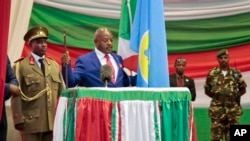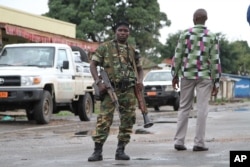Burundi’s government says it is ready for dialogue with all Burundians in and outside the country.
This follows calls last week by the United Nations and the African Union for an all-inclusive dialogue amongst Burundian stakeholders under the auspices of the east African community, mediated by Ugandan President Yoweri Museveni.
Foreign minister Alain Nyamitwe said “Let me say that not only that the dialogue is going to be based in the spirit of the Arusha Accord, but also, and most importantly on the constitution of the Republic of Burundi which has set up a number of institutions in charge of dialogue.”
Nyamitwe said Burundi already began an interparty dialogue in Bujumbura as of November 13.
The Burundian crisis began earlier this year after President Pierre Nkurunziza decided to run for a third term.
At least 240 people have been killed, and more than 200,000 have fled the country since the opposition took to the streets to protest the incumbent's refusal to give up power and they charged the president was violating the country's constitution.
Some opposition members accused President Nkurunziza of forming a non-inclusive government following his controversial reelection.
The 2000 Arusha Accord, which ended Burundi’s ethnic civil war, stipulates that 60 percent of members of parliament be from the majority Hutu ethnic group and 40 percent from the minority Tutsis.
Nyamitwe would not say which topics would be discussed during the dialogue, except to say it would be up to Burundians to decide.
The African Union Peace and Security Council issued a statement last Friday expressing “deep concern” at the continuing political impasse in Burundi, as well as the prevailing insecurity and violence in that country and the resulting humanitarian consequences.
“Council reaffirms the strong condemnation by the AU of all act of violence, committed by whomsoever, as well as of human rights abuses, including killings, extra-judicial executions, violations of the physical integrity of persons, acts of torture and other cruel, inhuman and/or degrading treatment, and arbitrary arrests and illegal detentions, violations of the freedom of the press and freedom of expression and the prevalence of impunity,” the AU said.
Nyamitwe said the situation in Burundi is calm and there is no need for either UN or African Union peacekeeping forces as some have suggested.
“For the UN to deploy a peacekeeping mission, there is a number of criteria which need to be considered. Burundi is not at the stage of Central African Republic; Burundi is not at the stage of let’s say Mali a few years back. However, the resolution talks about contingency planning without details. But contingency planning does not mean that there is a mission that is going to set foot in Burundi,” Nyamitwe said.
Meanwhile, amid increasing violence, the European Union Mission in Bujumbura has evacuated its nonessential staff and family members. The United States pulled its nonessential staff and families earlier this year.
Nyamitwe said countries who want to evacuate their nationals from Burundi have the sovereign right to do so. But he said the Burundian government will continue to fulfill its responsibility to protect not only its citizens but all foreigners.
“We have never heard of any expatriate who has been threatened or killed in Burundi since the demonstration started in Burundi. We have not heard that simply because their security was guaranteed. But if they decide to move them away from Burundi, it’s their choice. They are sovereign to send them to Burundi, but they also free to take them away,” he said.





